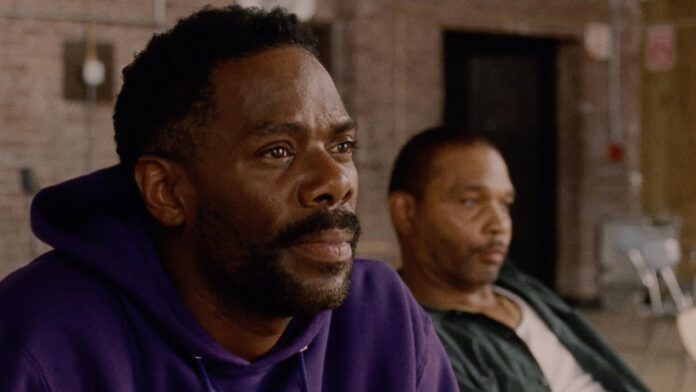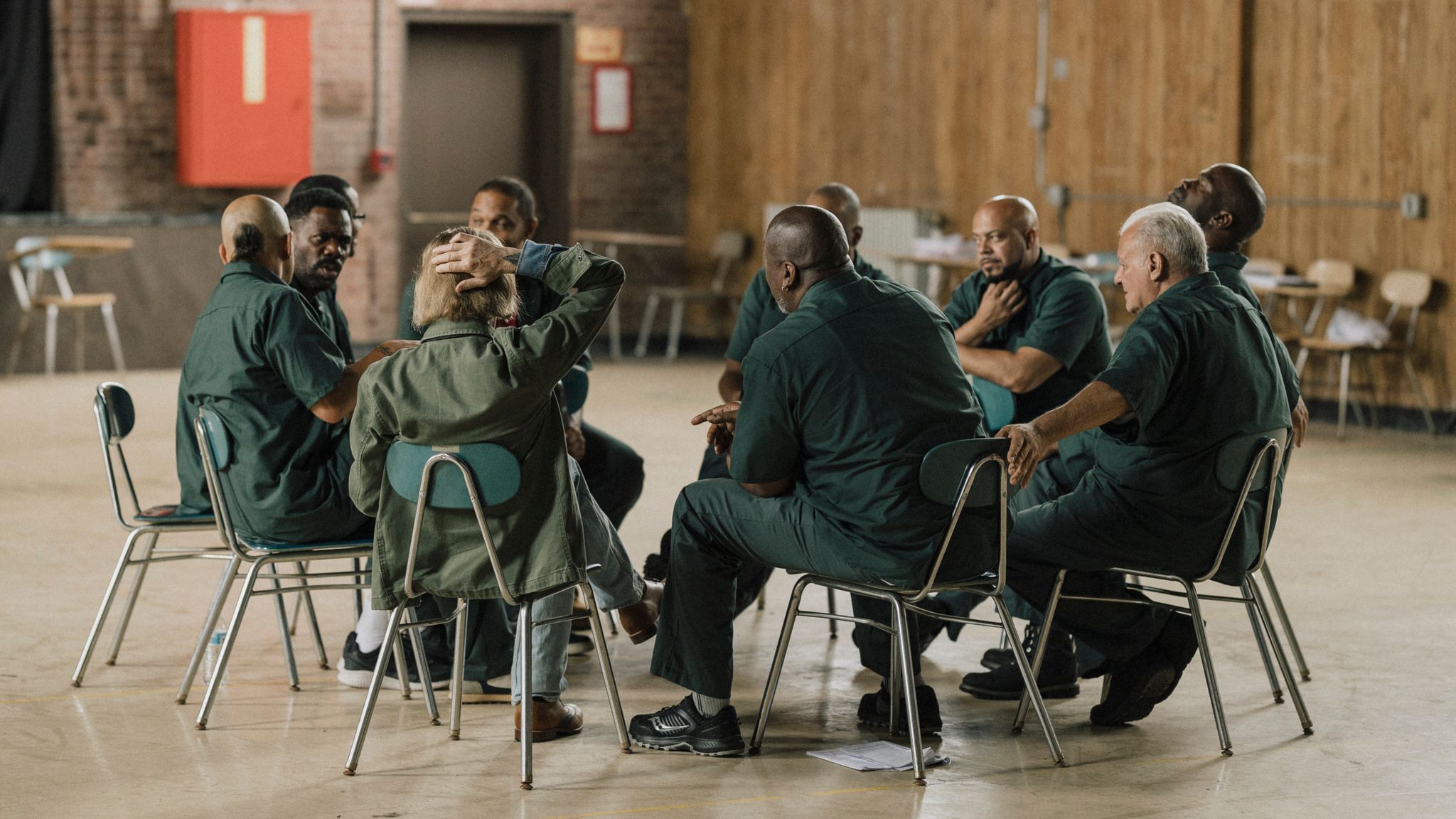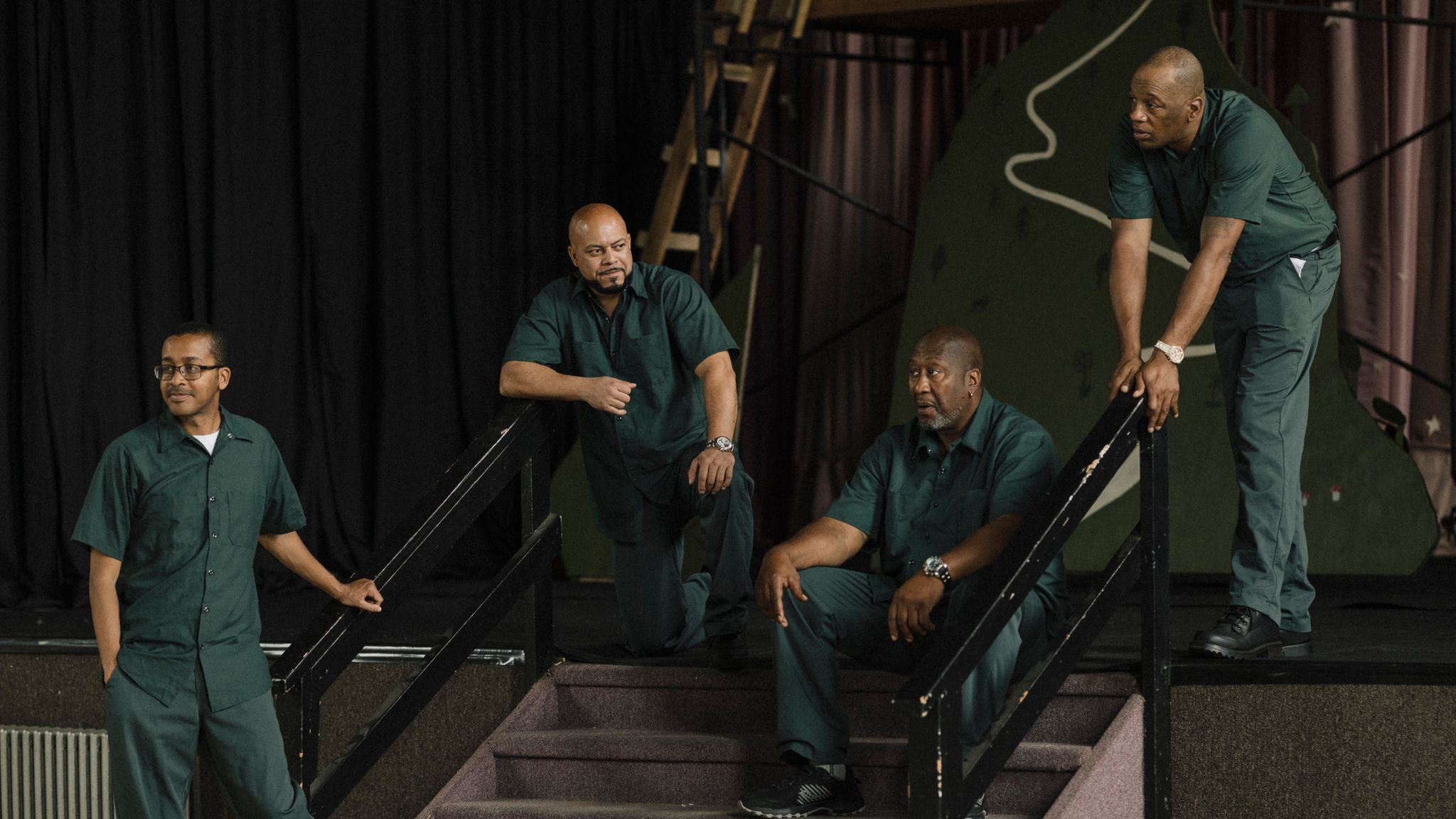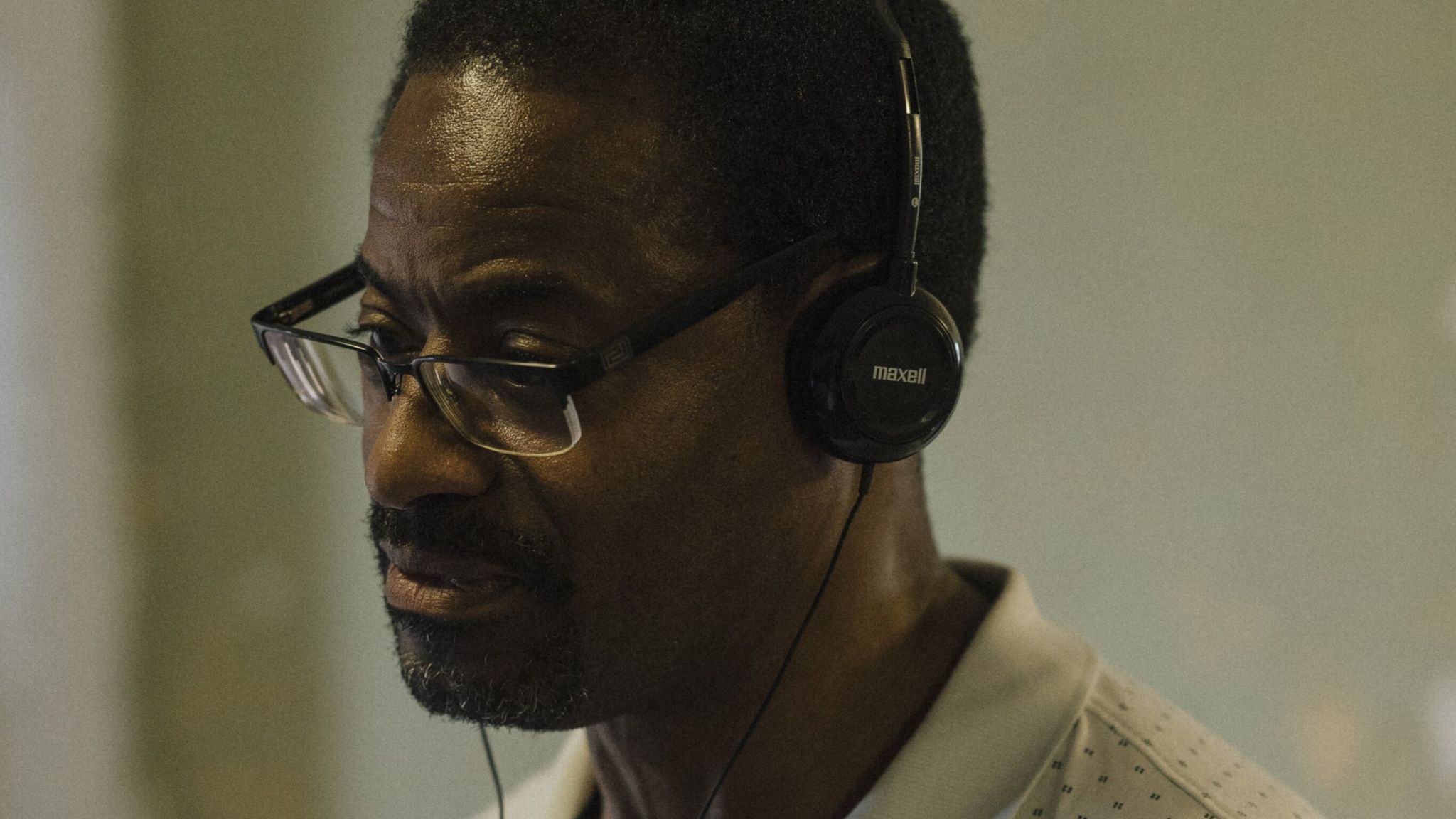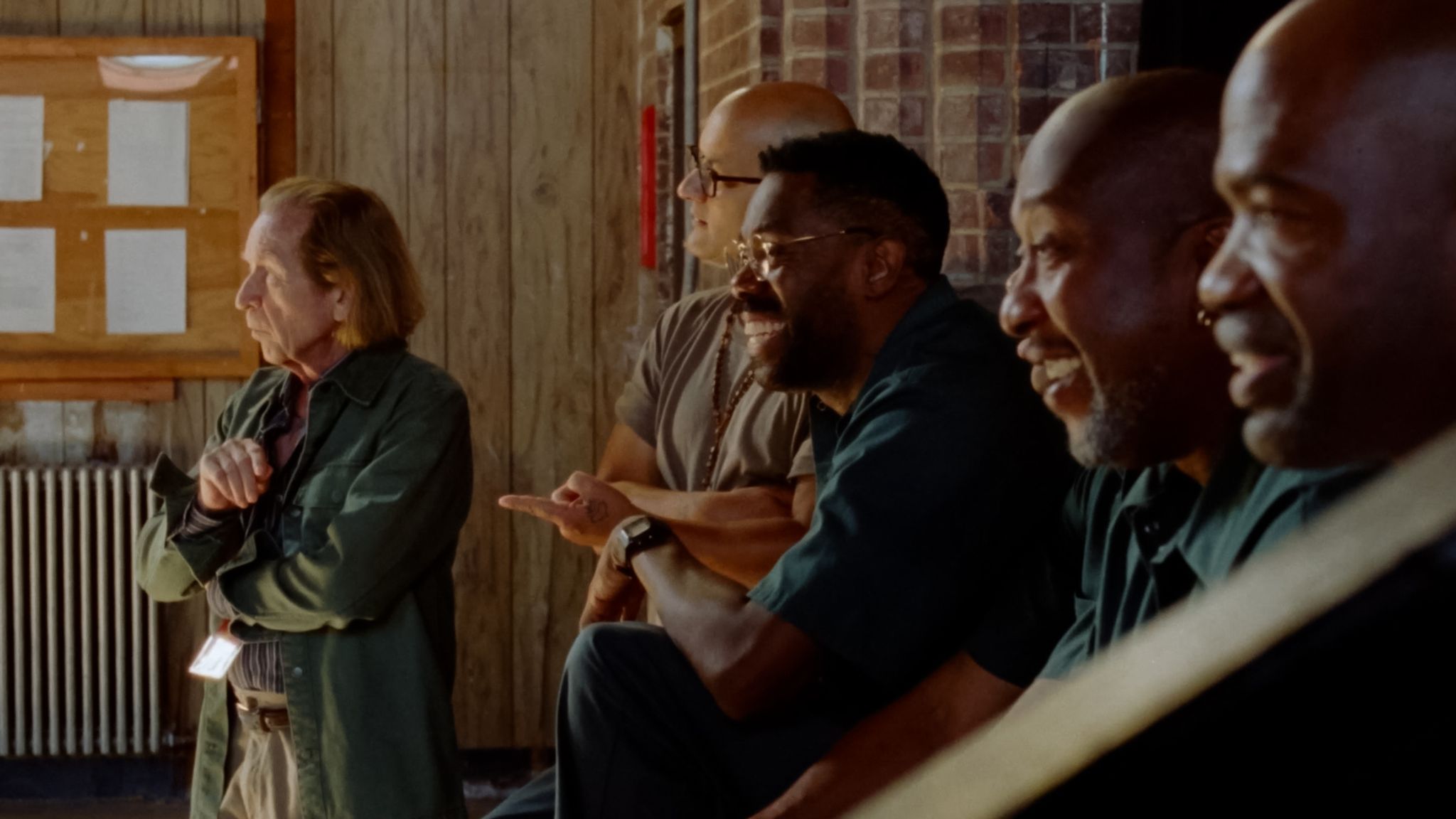“No one wants to voluntarily walk back into a situation like prison. Once that chapter is over and done, you want to put that behind you, start your life over. But there was a message that needed to get out.”
Clarence Maclin spent years of his life at the Sing Sing correctional facility, a maximum security prison in Ossining, New York state, serving a long sentence for robbery. Six years in, he stumbled across a group that would change his life.
The Rehabilitation Through The Arts (RTA) programme is now the subject of the film Sing Sing, starring Oscar nominees Colman Domingo and Paul Raci – alongside Maclin and other formerly incarcerated men who discovered hidden talents for acting inside the prison’s walls.
Before joining, Maclin was feared by other men in the prison, and guarded himself. Vulnerability is not something you show in jail. But something about this group flicked a switch.
“I was caught up in the stereotypes of what I’m supposed to be,” he says now, talking to Sky News on Zoom. “I look like I should be playing basketball or football.”
He tried to hone his basketball skills, but sport was never his forte. “I’m better at art, but back then I suppressed that. I came across RTA and unlocked it.”
In Sing Sing, he revisits his former life to play a modified version of himself – feared by others, extorting money from seemingly “weaker” men, and selling drugs. After coming across the programme, Maclin had to keep his prison record clear of infractions for a year before being accepted, but was determined to do so.
The film focuses on the true story of Divine G Whitfield (played by Domingo), a man who also found the programme after being imprisoned at Sing Sing for a crime he did not commit.
‘We’re a lot more than what you may think of us’
Learning to act in prison, with “poor acoustics, poor sound system”, Maclin had been taught for the stage – to be “overdramatic”, he laughs. Domingo helped him rein that in.
“[In prison] I have to use my instrument to make sure the guy in the last seat can hear me speak,” he says, enunciating as if on stage. “When you’re dealing with just that camera right there, it’s all right to bring it in.”
After leaving prison, Maclin has worked as a youth counsellor, creative arts specialist, and gang intervention specialist working with vulnerable boys. He is also an RTA consultant and an executive producer of Sing Sing.
There was “a lot of apprehension” about playing his former self. But he wants people to see the value of RTA, the transformative power of the arts.
“We’re a lot more than whatever you may think of us from viewing the movies or TV or news,” he says. “We need to show there’s a segment of population in every prison that is not a part of violence and not a part of the corruption, that are genuinely trying to make themselves better people and be better prepared when they come home, back into society.”
He pauses. “I’m not saying those violent things and those corrupt things that go on inside those type of institutions are not there. I’m just saying that that’s not all that’s there.”
His co-star Domingo is known for films such as the civil rights biopic Rustin and The Color Purple, both released last year, as well as his Emmy-winning performance in the HBO series Euphoria.
However, he started out in educational theatre, in schools “stripped of art”. He knows the impact it can have, he says, which is why, despite having less than three weeks between finishing The Color Purple and working on extra scenes for Rustin, he said yes to filming Sing Sing in between.
“I really thought I needed a break, so it had to be something very special,” he tells Sky News on a separate call. “But it felt like there was a pulse happening around the film… I went there to do the work that is about healing, and I think I gained so much more.”
How drama helped the inmates of Sing Sing
Domingo didn’t know much about the RTA programme before he started. “What I learned was, in this prison, this place where it actively can be a very dangerous place, especially dangerous when it comes to matters of the heart, and feeling vulnerable… it feels like an act of joyous disobedience to have a practice of theatre.”
He could see how it had helped the men who had joined. “They never used this word, but I truly did recognise they were exhibiting incredible amounts of tenderness with each other, which is also revolutionary.”
The statistics speak for themselves, he says, citing a figure which is highlighted by producers: while the national rate for people returning to prison in the US after incarceration was higher than 60%, fewer than 5% of RTA graduates return. “It shows the arts work.”
It was important to Domingo to show male friendship, platonic relationships, in a way that is not often portrayed on screen. Especially, he says, “depictions of black and brown men that are sort of smashing tropes that were just filled with toxic masculinity”.
The real Divine G Whitfield, he says, is “kind of shy… very bookish”. He called himself a “jailhouse lawyer” due to the time he spent in the library, reading up, advocating for himself and others.
“He was someone who still had hope,” says Domingo. “The idea of knowing someone who was on the inside and wrongly accused of a crime, serving time for something he didn’t commit; that he still had hope gave me everything I needed to know how to play him.”
Critics and viewers have praised the film. Its “commitment to the truth of its characters – and of life itself – is rare and precious,” says the Roger Ebert review, while Deadline describes it as “a beacon of hope”. Many viewers have been left in tears by the performances, the real-life stories of these men.
“In this very polarising time, everywhere in the world, we’re looking for moments to say we’re connected and we’re human, and you don’t have to be a product of what you were made up to be, or what someone thought you were,” says Domingo. “You can be different…
“When people are saying they sat there and sobbed and couldn’t get up from the movie theatre… I think it’s touched them somewhere deeply. It’s touched their humanity and made us feel more human again.”
‘If you look around, you may find somebody just like me’
Domingo is already receiving Oscars buzz for what would be his second consecutive best actor nomination. Maclin too, in his debut on-screen performance, is appearing on predictions shortlists for best supporting actor.
“Incredible,” he says. He never imagined the film would be received in this way.
“We didn’t think of it as having a longevity. I thought this was something that you put on your bucket list and you get it done: ‘All right, well, I did it, I did my bucket list.’ Now this has turned into a career opportunity… it’s more than a movie now, it’s a movement. It’s a real amazing feeling.”
Read more from Sky News entertainment:
Wu-Tang Clan star pivots to ballet
Tim Burton on ‘chaotic’ Beetlejuice sequel
More than an Oscar nomination, though, Maclin hopes the film will change perceptions. “For the brothers locked in, still inside, my message to them is: we are a lot more than what they call us – but we’re going to have to own it. We’re going to have to take it upon ourselves and not wait for the department of corrections to correct our behaviour; we got to correct our own behaviour and come back out here and be positive people in society.”
And for anyone watching the film, those learning for the first time about the RTA and its graduates’ stories, he says: “I would like for people to leave the cinema knowing there are good people in bad circumstances… that if you look around, you may find a ‘me’ – somebody just like me, somebody in need of a little compassion, a little empathy, somebody in need of a little hope. And if you can find it within you to pour a little bit of hope into somebody, I’m quite sure you’ll find a better individual.”
Sing Sing is out in cinemas in the UK and Ireland now
Source : Sky News



